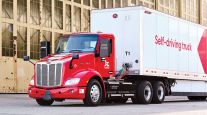Senior Reporter
California Bill Would Keep Drivers in Autonomous Cabs

[Stay on top of transportation news: Get TTNews in your inbox.]
California state legislators are moving closer to a final vote on a bill that would for roughly six years require drivers to be in the cab at all times for development of Society of Automotive Engineers Levels 3, 4 and 5 autonomous trucks.
Earlier this month the legislation, AB 316, unanimously passed out of the state Senate Transportation Committee after being approved earlier this year by the state’s Assembly, the lower body of the Legislature.
The bill has created a debate centering on whether the Legislature should require drivers to remain in the cab even after autonomous developers and regulators say their heavy AVs are ready to be deployed without drivers in the cab.
The bill would require the state’s Department of Motor Vehicles to submit a report to the relevant policy and fiscal committees of the Legislature that evaluates the performance of autonomous vehicle technology, including its impact on public safety and employment in the transportation sector. The deadline would be by Jan. 1, 2029, or five years after commencement of testing, whichever occurs later, and upon appropriation by the Legislature.
“The goal of AB 316 is simple,” Democratic Rep. Cecilia Aguiar-Curry, lead sponsor of the bill in the Assembly, told the committee. “Full testing and full deployment of an autonomous vehicle over 10,000 pounds can be permitted to operate on public roads in California. While we await the analysis of safety data recommendations to the Legislature by the executive branch, that vehicle must be accompanied by a qualified human safety operator.”

Aguiar-Curry
She added, “The only conceivable motivation for rushing forward without a monitor in the cab is to increase profits at the risk of public safety and the livelihoods of our trained expert trucking workforce.”
The legislation was supported by the International Brotherhood of Teamsters, which argued that not only would the bill ensure that autonomous trucks would be safe, but also would keep heavy truck drivers employed for years.
While the Transportation Committee questioned some of the provisions in the bill, its members voted July 11 to unanimously approve the legislation and pass it on to another committee for further review.
A video recording of the committee hearing captured the testimony, as well as comments by committee members, some of whom regarded AB 316 as “a tough bill.”

Wolf
Ariel Wolf, general counsel of the Autonomous Vehicle Industry Association, said the legislation would “chill investment” in heavy AV manufacturing, and that the decision for deployment should be made by the safety experts, and not the Legislature.
“In its current form, this bill is not a guardrail,” Wolf told the committee. “It is a total shutdown of a multibillion-dollar industry in California. That’s because it requires a human operator to be in the vehicle forever, in perpetuity. There is no sunset because in order to remove the requirement the Legislature has to act again, at the earliest, in six years.”
She added, “No company can plan to operate in California without the certainty that the technology will one day operate driverless. That’s the fundamental business case of autonomous trucking.”
But Aguiar-Curry insisted that the bill is not intended to harm the industry. She stressed that she wants testing and development of the heavy AV trucks to be transparent, and to deter behind-the-scenes lobbying by the truck manufacturers outside the public eye. She also stressed that driver input is valuable, and should not be ignored.
“Let me make this clear — I believe this technology has great potential,” she told the committee.
Want more news? Listen to today's daily briefing below or go here for more info:




